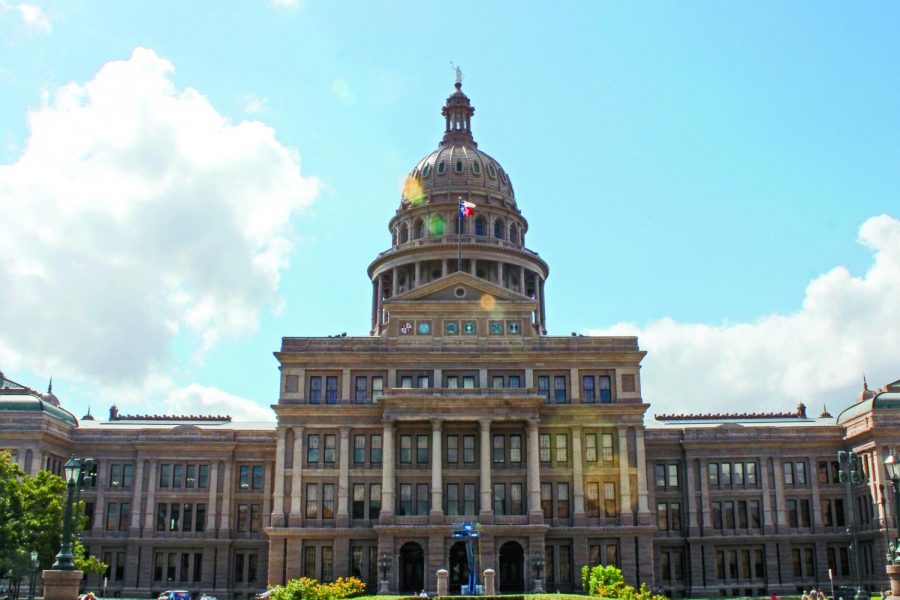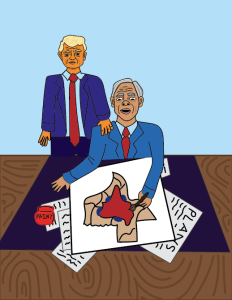State votes in over 800 laws following latest session
JUST A BILL: The capitol building on a bright fall day. The 86th legislative session lasted from Jan. 8 to May 27.
October 23, 2019
Following the 86th legislative session, an excess of 1,000 bills were passed and sent to the office of Governor Greg Abbott. 820 bills were either signed into law or were allowed to become a law without the Governor’s signature. The laws became effective on Sept. 1.
Many of the laws passed were of interest to students and staff here at Bowie. The new laws received mix reactions from constituents. Laws passed included ones about school funding, tobacco, free speech on campuses, gun carrying in natural disasters, transmission of unsolicited images, and women’s health, among others.
“There were quite a few laws passed after this session,” social studies teacher Dalton Pool said. “Some of them will have great effects on our community, others will not as they are very specific to a circumstance.”
A notable law that passed that will affect Bowie is House Bill 3 which provides $11.6 billion in education funding. Austin ISD, as a result, gave teachers with more than five years of experience a 7 percent raise while other employees will receive a 6 percent raise. AISD will also pay less money to the recapture program that subsidizes poorer school districts, leaving more money to be spent by the district.
“Being a teacher I was interested in the education bill,” Pool said. “I was encouraged by both sides coming together and working together to try to get more funding for schools and to try to raise pay for teachers.”
Another law that caused lots of stir was Senate Bill 21 which raised the age to purchase and possess tobacco to 21. Supporters of the law rejoiced that Texas was attempting to prevent another generation of nicotine addicts. Many believe this is in response to increased use of e-cigarette devices among teenagers who had previously not used other forms of tobacco before.
“For the past 30-40 years, the US at large has had a lot of success reducing tobacco usage and reducing addiction to nicotine, especially in the younger population,” Pool said. “But I think e-cigarettes have made that a challenge.”
Following protests of members of hate groups like Texas A&M University canceling a rally by white nationalist Richard Spencer, Texas passed Senate Bill 18 which allows any person to engage in free speech activities on college campuses.
“There’s a lot of things that polarize Americans these days,” senior Abbas Akhtar said. “But if the fundamental right to express our thoughts and opinions is infringed, whether right or left-leaning, it can damage the ideals that hold us together.”
In the wake of gun violence in Texas, a new law was passed allowing firearm owners to keep their guns on their body for seven days after a natural disaster even if they are not licensed. Before, some firearm owners had to leave their weapons behind if they were under mandatory evacuation.
“This law will make law enforcement’s job tougher than it already is when there is a natural disaster,” Akhtar said. “Imagine people taking the law into their own hands or making threats in these already tense times.”
In the age of digital media, the sharing of media has become easier than ever. Some people have taken advantage of that by sending unsolicited sexually explicit images of themselves electronically, also known as unsolicited nudes. With the passage of House Bill 2789, it is now a misdemeanor to send such images without the receiver’s consent.
“Too many people receive pictures they don’t want and feel attacked,” senior Makena Patterson said. “There used to be no way to punish the sender or make them feel the repercussions of their actions, but now there is and hopefully this deters it.”
Women’s health advocates were angered to see Senate Bill 22 passed. The law prohibits state and local governments from working with agencies that perform abortions, even if the agencies provided other women’s health procedures like mammograms and pap smears which are unrelated to abortion.
“This law hurts women and society as a whole,” Patterson said. “It’ll make the cost of services higher, so instead of screening people for things like HPV which can cause cancer, we may have to treat more people for cancer.”
Even though the laws passed this legislative session brought out many different opinions from constituents, the lawmaking process allows constituents to have their voice heard and their vote count.
“I still have complete faith in our democracy and our law-making process,” Akhtar said. “Although I might not agree with laws passed, the lawmaking process is part of our republic that we hold so dear.”










